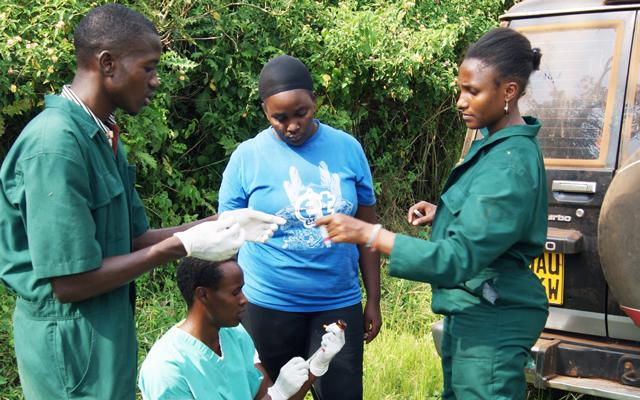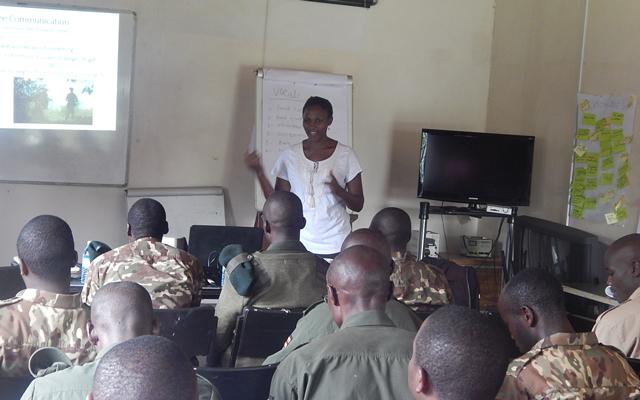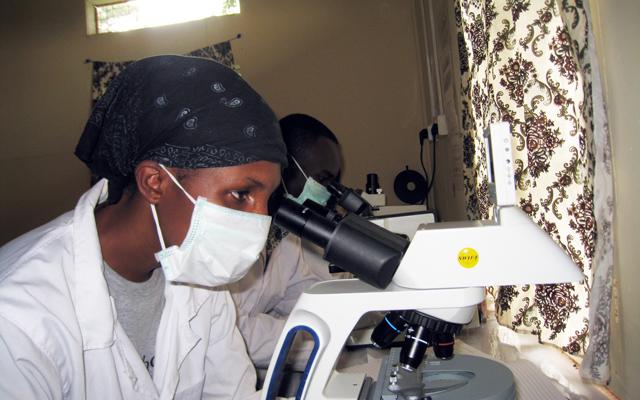Caroline Asiimwe, a veterinarian and an environment conservation leader from Uganda, was named the first winner of the TWAS-Samira Omar Innovation for Sustainability Prize. Asiimwe was honoured for her influential work to engage Ugandan refugees and poachers with wildlife conservation, a strategy that has also fostered an unprecedented exchange of knowledge between scientists and indigenous people.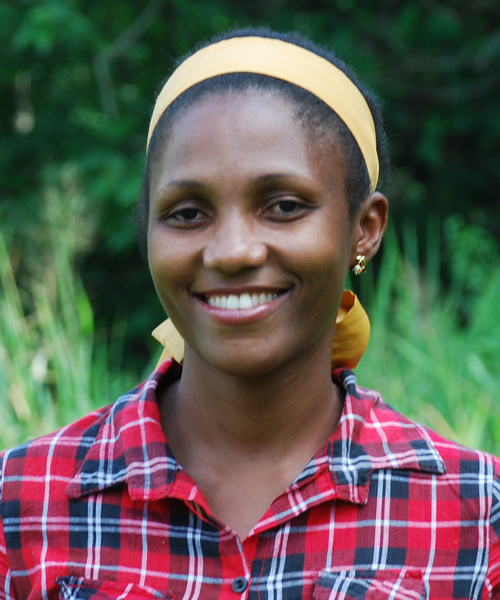
The new award is named for Kuwaiti conservation researcher and TWAS Fellow Samira Omar Asem, and honours scientists from Least Developed Countries for their scientific achievements in the field of conservation and management of natural resources. It includes a prize of USD$4,000, underwritten by Omar.
"This prize from TWAS is a great motivation for me, in my career," said Asiimwe. "There is a great feeling you get when you are recognised and your efforts appreciated ... Receiving an international award is something that not only puts me on a global map, but also encourages my fellow women in conservation that our efforts are not all in vain. It is a great honour."
Asiimwe holds a master's degree in veterinary science at the University of Edinburgh in Scotland. Her contributions to the management of natural resources at the Budongo Conservation Field Station in Uganda, where she has been working for seven years as a resident veterinarian and conservation coordinator, are varied. She works with vulnerable communities on the forest's edge to reduce their dependency on forest resources. She engages ex-poachers in activities as eco-guards. She directs targeted interventions to rescue mutilated chimpanzees and other animals suffering from injuries caused by humans. She collects and organises data to ensure sustainable conservation of Ugandan resources.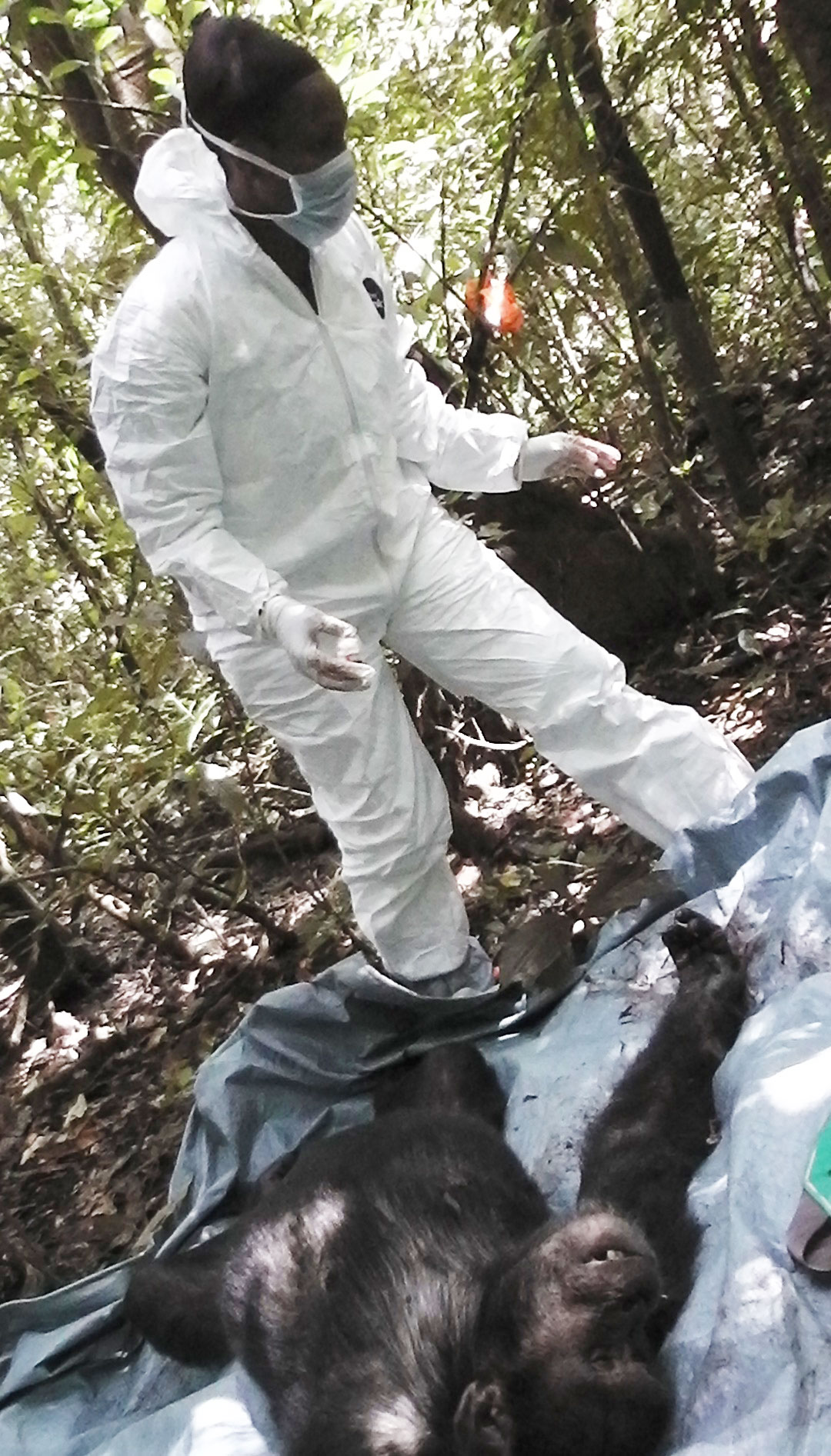
The dream of having a positive impact on wildlife emerged when Caroline Asiimwe was in secondary school, in the 2000s. She knew she wanted to save animals, but the idea of becoming a veterinarian had not come to her mind, at that time. Later, when she was attending courses at Makerere University in Uganda's capital city, Kampala, her determination grew stronger and she decided she would work for any wildlife agency to help animals.
"My aspiration was to preserve healthy ecosystems in a sustainable way," she recalled. "I believe that health and welfare problems faced by animals and humans are complex and dynamic, calling for trans-disciplinary, problem-solving approaches."
Tourism related to wildlife brings a significant contribution to Uganda's economy, even if this value cannot be quantified precisely. Chimpanzees, for example, are beloved among wild animals and are an important attraction. They live all over Africa, with higher concentrations in Gabon, Cameroon and Congo, but Uganda hosts an important colony of about 5,000 individuals, according to recent estimates.
Unfortunately, they are also an endangered species. Chimps are a common target for poachers who kill them for their meat. They kill elephants for the ivory, rhinos for the horn, and pangolins for making illegal recreational drugs.
As Asiimwe soon realized, stand-alone strategies arrive at a dead-end. This prompted her to opt for team-building with refugees who live around Budongo Forest, because of their long-standing presence and great adaptation to the culture of the indigenous people. The refugees come from Northern Uganda and Congo (DRC). They moved to Masindi, the Western region of Uganda, during the rebellion triggered by the Lord Resistance Army. Many people were displaced from their homes in the North and West Nile regions of Uganda, many were also fleeing from the war.
Refugees are among the most vulnerable people in Uganda: they are economically deprived, uneducated and insecure, and it took a lot of efforts to convince them that Asiimwe and colleagues were not enemies. For these people, the forest's resources – plants and animals – are an important resource essential to their lives. And at the beginning, it was difficult to convince them to make a change.
Since they were not targeting endangered chimpanzees, they wondered, then what was the problem? As Asiimwe explained: "We had to show them that their snares are indiscriminate and that many chimpanzees are dying or getting maimed. Pictures did the magic and that’s when they understood the damage they were causing to the endangered chimpanzees that they never intended to hurt."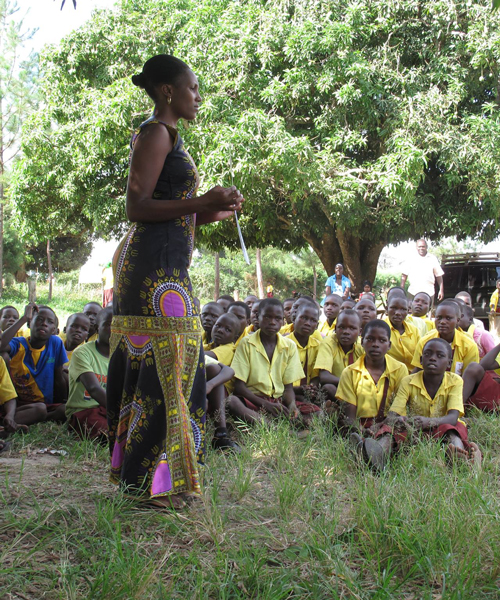
In her conservation efforts, Asiimwe engaged also hunters and poachers. They were among the poorest people in the forest in the communities: to support their families they relied on forest resources they considered free, recalled Asiimwe. "Because they were among the poorest, they could not support their children's education, and thus children were recruited and trained on how to hunt at an early age."
Finding a way to work with hunters and convince them to stop hunting has not been easy. After a series of confidence-building meetings with Asiimwe and the personnel at the Budongo Conservation Field Station (BCFS), these hunters finally asked for an alternative source of livelihood. "We signed an agreement with them and gave them alternative livelihood sources. First only goats, then later improved seed varieties. We still treat their livestock quarterly to prevent infections, especially intestinal worms and ecto-parasites," said Asiimwe.
And today, a growing number of them are now ex-hunters and ex-poachers.
Along with colleagues, she now collaborates with former poachers in patrolling the forest to recover illegal snares. "Currently, we employ six ex-poachers as our eco-guards," she explained. "Occasionally we bring them to participate in the search of forest areas where traps are suspected to be very high. Without indigenous knowledge of what guides the poachers to set traps in some parts of the forest rather than others, we would never recover enough snares to minimise injuries to chimpanzees."
Sometimes her duties put her in danger. "I feel threatened when we encounter illegal timber loggers" she said. "I recall once when our eco-guards met pit-sawyers and were surrounded with guys holding machetes. Our eco-guards were quick at claiming to be looking for some tree species for harvest themselves. That saved them!" Asiimwe's current research is focused on the ecological and anthropogenic factors that drive poaching. "This TWAS prize will help me successfully accomplish this study," she said. "Results will be useful for conservation agencies to strategize their enforcement efforts since resources have been a hindrance in covering the whole Budongo forest reserve of about 853 km2."
Asiimwe's research career is just beginning. With her background in veterinary medicine, public health and conservation, she intends to explore all avenues in those research lines. "One of the most amazing aspects of my work," she said, "is collaboration and information-exchange between us academicians and ex-poachers with their indigenous knowledge. I guess any research in ecosystem health will suit me well in the future."
Cristina Serra
About the TWAS-Samira Omar Innovation For Sustainability Prize
This new annual prize, named after the TWAS Fellow Samira Omar Asem, recognizes scientists from the 47 Least Developed Countries (LDCs). It carries a cash award of USD4,000 generously provided by Professor Omar. The prize will honour scientists working in an area relevant to sustainability. The “Innovation for Sustainability” Prize will reward scientists for their contribution in a multidisciplinary area directly relevant to the science of sustainability. The 2017 prize was intended for a female scientist based on scientific achievements in conservation and management of natural resources.
About Samira Omar Asem
Professor Samira Omar Asem is the director general of the Kuwait Institute for Scientific Research (KISR). She has been a TWAS Fellow since 2014 and currently serves as the Academy's treasurer. She is a rangeland manager, certified by the Society of Range Management, California Section, USA, and has extensively contributed to the conservation and sustainable development of renewable natural resources. She is also a member of the Organization for Women in Science for the Developing World (OWSD), and formerly served as vice president for the Arab Region of OWSD. In addition, she is aregional councilor for the International Union for Conservation of Nature (IUCN) West Asia Region. Omar holds a PhD in wild land resource science from the University of California, Berkeley.
About TWAS
The World Academy of Sciences for the advancement of science in developing countries – TWAS – works to advance sustainable prosperity through research, education, policy and diplomacy. TWAS was founded in 1983 by a distinguished group of scientists from the developing world, under the leadership of Abdus Salam, the Pakistani physicist and Nobel Prize winner. Today, TWAS has some 1,200 elected Fellows from 96 countries; 15 of them are Nobel laureates. The Academy is based in Trieste, Italy. Through more than three decades, its mission has focused on supporting and promoting excellence in scientific research in the developing world and applying scientific and engineering research to address global challenges. TWAS receives core funding from the government of Italy and essential programmatic funding from the Swedish International Development Cooperation Agency (Sida). The United Nations Educational, Scientific and Cultural Organization (UNESCO) administers TWAS funds and personnel.
Learn more about TWAS at www.TWAS.org. Follow TWAS on Facebook and Twitter (@TWASnews).


